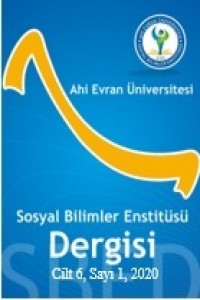Sırt Çantalı Gezginlerin Demografik Özellikleri İle Kişisel Gelişimleri Arasındaki Farklılığın İncelenmesi
Öz
Turizm tüketimi, özünde kendilik
hissini keşfetmeye çalışan bireyle ilgilidir. Bu keşif ise çoğu zaman olumlu
bir değişim yani kişisel gelişim ile sonuçlanmaktadır. Sırt çantalı gezginlerin
de seyahat şekli ve süresi göz önüne alındığında, diğer turist tiplerine
nazaran seyahatleri sonrasında kendilerinde algıladıkları ya da hissettikleri
değişikliklerin daha fazla olduğu söylenebilir. Bu araştırmada Türk sırt
çantalı gezginlerin seyahatleri sonrasında hissettikleri kişisel gelişimi
tespit edebilmek ve gezginlerin demografik özelliklerine göre kişisel
gelişimlerinin farklılaşıp farklılaşmadığını belirlemek amaçlanmıştır. Evrenin
belirsizliği sebebiyle kartopu örneklemesine başvurulmuştur. Veri toplama aracı
olarak anket tekniği kullanılmıştır. Sırt çantalı gezginlerin kişisel
gelişimlerini ölçebilmek amacıyla Chen, Bao & Huang (2014) tarafından
tasarlanan “sırt çantalı gezgin kişisel gelişim ölçeği”nden faydalanılmıştır.
Veriler 2018 yılı Eylül-Ekim aylarında toplanmıştır. Elde edilen verilere
farklılık analizleri uygulanmıştır. Araştırma sonucunda gezginlerin cinsiyet
dışında diğer tüm değişkenler açısından kişisel gelişimlerinin anlamlı
farklılıklar gösterdiği tespit edilmiştir.
Tourism consumption, in essence, is about the individual who is trying
to discover the sense of self. This discovery often results in a positive
change, ie personal development. Considering the type and duration of travel of
the backpackers, it can be said that the changes they perceive or feel after
their travels more than the other types of tourists. In this study, it is aimed
to determine the personal development of the Turkish backpackers after their
travels and to determine whether their personal development differs according
to the demographic characteristics of the travelers. Snowball sampling was
applied due to the uncertainty of the universe. Survey technique was used as
data collection tool. In order to measure the personal development of backpackers,
“backpacker personal development scale” designed by Chen, Bao & Huang
(2014) was utilized. Data were collected in September-October 2018. Difference
analysis were applied to the data. As a result of the study, it was determined
that the personal development of the travelers in terms of all variables other
than gender showed significant differences.
Anahtar Kelimeler
Kişisel gelişim Demografik özellikler Sırt çantalı gezginler Türkiye
Kaynakça
- Chen, G., Bao, J. ve Huang S (S). (2014), Developing a scale to measure backpackers’ personal development, Journal of Travel Research, 53(4), 522–536.
- Chen, G. ve Huang, S (S). (2017), Toward a theory of backpacker personal development: cross-cultural validation of the bpd scale, Tourism Management, 59, 630-639.
- Chen, G., Huang, S. (S) ve Hu, X. (2018), Backpacker personal development, generalized self-efficacy, and self-esteem: testing a structural model, Journal of Travel Research, 1–15.
- Cohen, E. (1973), Nomads from affluence: notes on the phenomenon of drifter-tourism, International Journal of Comparative Sociology, 14(1), 89–103.
- Desforges, L. (2000), Traveling the world: ıdentity and travel biography, Annals of Tourism Research, 27(4), 926-945.
- Harman, S. (2012), Sırtçantalı Turistlerin Seyahat Motivasyonları ve İlgilenimleri: İstanbul’a Gelen Sırtçantalı Turistler Üzerinde Bir Araştırma, (Yayımlanmış Doktora Tezi), Çanakkale Onsekiz Mart Üniversitesi, Sosyal Bilimler Enstitüsü, Çanakkale.
- Harman, S., Çakıcı, A. C. ve Akatay, A. (2013), İstanbul’a gelen sırtçantalı turistlerin seyahat motivasyonları üzerine bir araştırma, Selçuk Üniversitesi İktisadi ve İdari Bilimler Fakültesi Sosyal ve Ekonomik Araştırmalar Dergisi, 13(25), 267-300.
- Harman, S. (2014), Bağımsız seyahat eden yerli gezginlerin seyahat motivasyonları üzerine bir araştırma, Uluslararası Yönetim İktisat ve İşletme Dergisi, 10(21), 107-128.
- Hsu, C.-Y., Lee, W.-H. & Chen, W.-Y. (2017), How to catch their attention? taiwanese flashpackers ınferring their travel motivation from personal development and travel experience, Asia Pacific Journal of Tourism Research, 22(2), 117-130.
- Loker-Murphy, L. & Pearce, P. (1995), Young budget travelers: backpackers in Australia, Annals of Tourism Research, 22(4), 819-843.
- MaccannelL, D. (1989), The tourist: a new theory of the leisure class, Schocken, New York.
- Miao, X. (2016), The role of self-reflection in backpackers’ personal development: an autoethnographic perspective, Tourism Tribune, 31(11), 22-31.
- Noy, C. (2004), This trip really changed me: backpackers’ narratives of self-change, Annals of Tourism Research, 31(1), 78–102.
- Oliveira-Brochado, A. & Gameiro, C. (2013), Toward a better understanding of backpackers’ motivations, TÉKHNE - Review of Applied Management Studies, 11, 92-99.
- O’reilly, C. C. (2006), From drifter to gap year tourist, mainstreaming backpacker travel, Annals of Tourism Research, 33(4), 998–1017.
- Paris, C. M. (2010). Backpacker activities and personal values: an SEM approach, Annals of Leisure Research, 13(1-2), 239-258.
- Paris, C. M. (2012), Flashpackers: An emerging sub-culture?, Annals of Tourism Research, C: 39, S: 2, ss. 1094–1115.
- Paris, C. & Teye, V. (2010), Understanding backpacker motivations: a travel career approach, Journal of Hospitality Marketing & Management, 19(3), 244-259.
- Pearce, P. L. & Foster, F. A. (2007), ‘University of travel’: backpacker learning, Tourism Management, 28(5) 1285-1298.
- Scarinci, J., & Pearce, P. (2012), The perceived ınfluence of travel experiences on learning generic skills, Tourism Management, 33(2), 380-386.
- Thatcher, C. A. (2010), International Learning Adventures: A Phenomenological Exploration of International Backpacker-Style Study Abroad. Prescott College (Published Doctoral Dissertation), USA.
- Uriely, N., Yonay, Y. & Simchai, D. (2002), Backpacking experiences: a type and form analysis, Annals of Tourism Research, 29(2) 520–538.
- Wilson, D. (1997), Paradoxes of tourism in Goa, Annals of Tourism Research, 24(1), 52-75.
- Yılmaz, G. (2018), Üniversite gençliğinin turizme bakış açısı: İstanbul Arel Üniversitesi örneği”. OPUS –Uluslararası Toplum Araştırmaları Dergisi, 8(15), 1516-1538.
Ayrıntılar
| Birincil Dil | Türkçe |
|---|---|
| Bölüm | Makaleler |
| Yazarlar | |
| Yayımlanma Tarihi | 29 Mart 2020 |
| Gönderilme Tarihi | 22 Temmuz 2019 |
| Yayımlandığı Sayı | Yıl 2020 Cilt: 6 Sayı: 1 |

